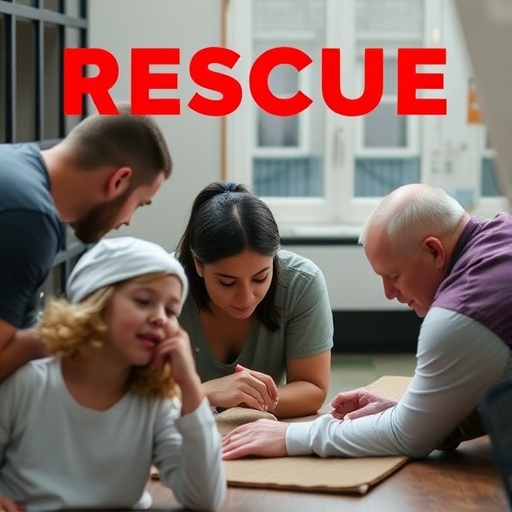In an unprecedented move to enhance patient safety and promote a supportive culture within healthcare institutions, researchers have unveiled the RESCUE certification framework. This groundbreaking initiative targets the phenomenon known as “second victim” syndrome, which refers to the psychological trauma healthcare professionals often endure after encountering adverse events in patient care. These events can leave professionals grappling with feelings of guilt, self-doubt, and anxiety, subsequently affecting their performance and, ultimately, patient outcomes.
The RESCUE framework aims to standardize the support offered to these second victims, ensuring a holistic approach that recognizes and addresses their emotional and psychological needs. By creating a consistent protocol across healthcare facilities, the framework seeks to provide a sense of security and mental well-being for professionals who might otherwise feel isolated or stigmatized in the aftermath of such incidents.
Integral to the development of the RESCUE framework is the recognition that healthcare providers carry a heavy emotional burden. Each adverse patient incident is not merely a clinical failure but a deeply personal experience for the involved healthcare workers. These professionals often engage in intense self-reflection and may struggle with the implications of the incident long after the clinical aspects have been resolved. The RESCUE framework acknowledges this reality, offering tools and resources tailored to alleviate the psychological toll on healthcare providers.
To ensure the effectiveness of this certification, diverse stakeholders, including healthcare practitioners, mental health experts, and institutional leaders, collaborated on its development. The collective aim was to establish evidence-based practices that would deliver comprehensive support systems for affected individuals. Workshops, training sessions, and educational resources will be made available as part of the RESCUE initiative, equipping healthcare organizations to better understand and implement the certification guidelines.
Critically, the RESCUE framework promotes transparency and communication within healthcare teams. By fostering an environment where emotional responses can be discussed openly, organizations stand to benefit from improved teamwork and more robust patient safety practices. Emphasizing a culture of psychological safety, the RESCUE framework encourages open dialogue about errors and incidents, which can de-stigmatize discussions around second victim syndrome.
Moreover, the implementation of RESCUE holds the potential to prevent future incidents by enhancing staff awareness and ensuring that healthcare teams are well-supported after adverse events. The intertwined nature of patient safety and provider well-being is essential to improving overall healthcare delivery and outcomes. Ultimately, when healthcare professionals feel supported in their roles, they are far more likely to deliver high-quality care to patients.
As the RESCUE framework rolls out, organizations will undergo a rigorous certification process designed to assess their readiness and commitment to implementing the provisions outlined. This process involves meticulous evaluations of existing support systems, staff training initiatives, and the overall culture surrounding second victim issues within their environment. Institutions achieving certification will not only benefit their personnel but will also gain public recognition for their commitment to mental health as a core aspect of patient care.
The broader implications of this certification framework extend beyond individual institutions. By establishing RESCUE as a standard, healthcare can move toward a paradigm shift where mental health is seamlessly integrated into operational strategies. This shift positions healthcare as a forward-thinking sector that values the emotional well-being of its workforce, ultimately enhancing resilience in healthcare systems worldwide.
As part of the research community, it is essential to measure the impact of the RESCUE framework on both second victims and overall hospital safety metrics. Future studies will look into the correlation between RESCUE certification and staff turnover rates, incidents of burnout among healthcare professionals, and the overall level of patient satisfaction. Such data will be instrumental in refining the framework and ensuring its long-term viability and relevance.
The introduction of the RESCUE certification framework represents a meaningful step towards reshaping healthcare’s approach to emotional trauma experienced by providers. By focusing on the psychological well-being of healthcare professionals, institutions can fortify their commitment to patient safety while fostering an environment that nurtures both staff and patient welfare.
As the healthcare landscape continues to evolve, so too must the initiatives that protect those who dedicate their lives to caring for others. With frameworks like RESCUE, the potential for transformational change within the healthcare industry becomes increasingly tangible. Embracing this new paradigm allows for not only enhanced patient care but also a healthier, more sustainable environment for healthcare professionals.
In conclusion, the RESCUE certification framework serves as a model for addressing the complex interplay between patient safety and the emotional challenges that healthcare professionals face. It aims to build a future where second victim syndrome is openly acknowledged, thus ensuring that the focus remains on healing—both for patients and the caregivers who support them.
Subject of Research: Second Victim Syndrome in Healthcare Professionals
Article Title: Standardizing second victim support: development of the RESCUE certification framework for health care institutions
Article References:
Mira, J.J., Potura, E., Schrøder, K. et al. Standardizing second victim support: development of the RESCUE certification framework for health care institutions.
BMC Health Serv Res 25, 1539 (2025). https://doi.org/10.1186/s12913-025-13741-2
Image Credits: AI Generated
DOI: https://doi.org/10.1186/s12913-025-13741-2
Keywords: Second Victim Syndrome, RESCUE Certification Framework, Healthcare Support, Patient Safety, Emotional Well-being




